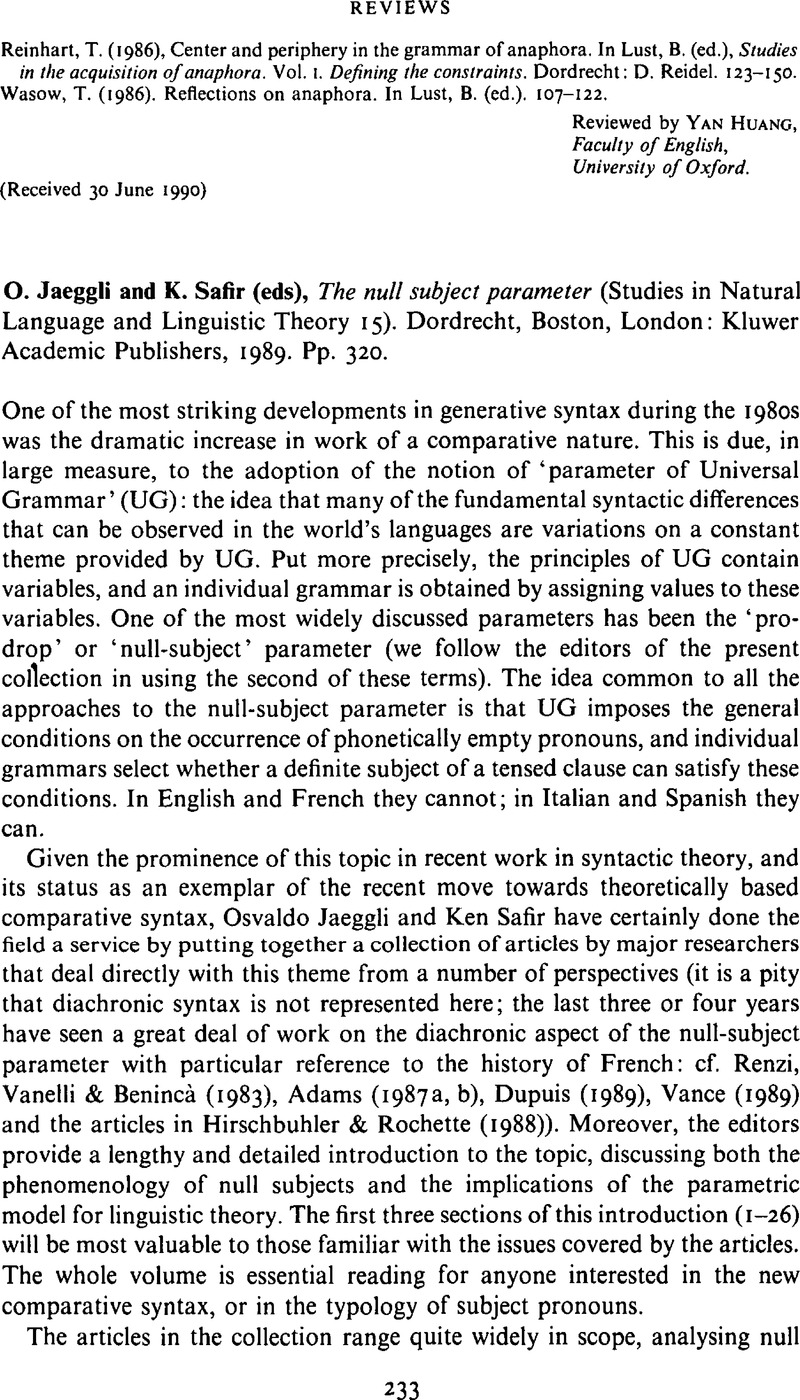No CrossRef data available.
Article contents
O. Jaeggli and K. Safir (eds), The null subject parameter (Studies in Natural Language and Linguistic Theory 15). Dordrecht, Boston, London: Kluwer Academic Publishers, 1989. Pp. 320.
Review products
O. Jaeggli and K. Safir (eds), The null subject parameter (Studies in Natural Language and Linguistic Theory 15). Dordrecht, Boston, London: Kluwer Academic Publishers, 1989. Pp. 320.
Published online by Cambridge University Press: 28 November 2008
Abstract
An abstract is not available for this content so a preview has been provided. Please use the Get access link above for information on how to access this content.

- Type
- Reviews
- Information
- Copyright
- Copyright © Cambridge University Press 1991
References
REFERENCES
Adams, M. (1987b). Old French, null subjects and verb second phenomena. PhD thesis, UCLA.Google Scholar
Chomsky, N. (1982). Some concepts and consequences in the theory of Government and Binding. Cambridge, MA: MIT Press.Google Scholar
Clahsen, H. (1986). Verb inflections in German child language. Linguistics 24. 79–121.CrossRefGoogle Scholar
Dupuis, F. (1989). L'expression du sujet dans les propositions subordonnées en ancien français. PhD thesis. Université de Montréal.Google Scholar
Engdahl, E. (1988). Implicational universals: parameters in GB and GPSG. Working Papers in Scandinavian Syntax, 40.Google Scholar
Foulet, L. (1935/1936), Le développement de la forme oblique du pronom personnel en ancien français. Romania 61, 62.Google Scholar
Gilligan, G. (1987). A cross-linguistic approach to the pro-drop parameter. PhD thesis, University of Southern California.Google Scholar
Heim, I. (1982). The semantics of definite and indefinite noun phrases. Amherst, MA: Graduate Linguistics Student Association, Department of Linguistics, University of Massachusetts, Amherst.Google Scholar
Hirschbuhler, P. & Rochette, A. (eds) (1988). La syntaxe historique du français. (= Revue québecoise de linguistique théorique et appliquée, 7:3.)Google Scholar
Pollock, J.-Y. (1986). Sur la syntaxe de en et le paramètre du sujet nul. In Ronat, M. & Couquaux, D. (eds), La grammaire modulaire. Paris: Les Editions de Minuit. 212–248.Google Scholar
Renzi, L., Vanelli, L. & Benincà, P. (1983). Typologie des pronoms sujet dans les langues romanes. In Linguistique descriptive, phonétique, morphologie et lexique. Actes du XVIIème Congrès International de Linguistique et de Philologie Romanes. Aix-en-Provence. Vol. 3. 163–176.Google Scholar
Vance, B. (1989). Null subjects and syntactic change in Medieval French. PhD thesis, Cornell University.Google Scholar


